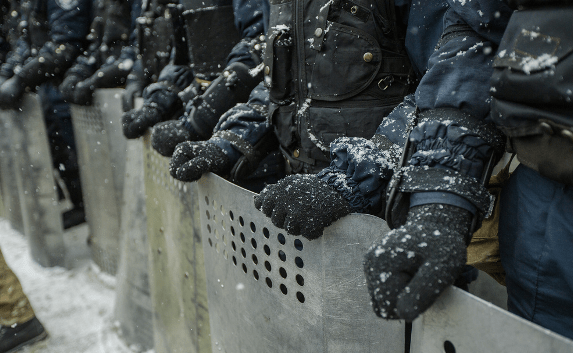“Dignity in Ukraine is Violated Every Day”
Political scientists Iryna Solonenko and Vasyl Kosiv talk about the Maidan protests, the role of civil society and the fight for political accountability in Ukraine.
BTI Blog: In early 2014, the Maidan is still occupied by demonstrators, and protests against President Yanukovych’s rule continue, seemingly unabated. What are the factors contributing to the opposition’s persistence, and what are the chances of success?
Iryna Solonenko & Vasyl Kosiv: Most importantly, Maidan protesters are driven by something more than ideological slogans or the affiliation with a particular political party. The brutal dispersal of demonstrations and beatings of peaceful protesters have been very emotional events. The authorities crossed a red line by responding to peaceful protests with violence. For many Ukrainians, the social contract has been violated, and this has undermined authorities’ legitimacy. The notion of “dignity” is raised increasingly in public speeches and private discussions. And human dignity in Ukraine is violated every day by corrupt politicians, judges, the police and tax administration officers. In this sense, the prosecution and imprisonment of activists and the violence against journalists “feed” Maidan with new energy every day. Moreover, there is an awareness that once the protests stop, massive repression against all those involved will take place and political freedoms might be curtailed further. Continuing the protests therefore seems necessary. Yet, protests alone will not succeed unless they divide political elites and create a majority in parliament eager for change. It is also important to go beyond Maidan and engage more people in opposition to the regime, notably from the Eastern and Southern regions. Many people have begun to think critically and stand up against injustice back in their home towns and villages as well; this is a very positive development and constitutes a major success. Yet, more has to be done.
BTI Blog: From a Western perspective, Ukraine’s political polarization is cast in geographical terms – the pro-European opposition demanding more political participation and an improved rule of law versus a Moscow-oriented president and his followers drawing on authoritarian forms of rule. Is this an oversimplification of the state of affairs?
Solonenko & Kosiv: This is definitely an oversimplification. The most important split today is found between active citizens and people advancing a post-Soviet paternalistic mentality. Age is another distinguishing factor. Young people everywhere do not like authoritarianism. However, much of the active citizenry striving for a changed model of governance that is more responsive and accountable is rather well educated, has traveled abroad and can primarily be found in Kyiv, the Western regions of Ukraine and some other big cities. So there is to some extent a geographical division that is inter alia shaped by economic issues. Business structures in the western regions are flexible with small- and medium-sized family enterprises. People in the eastern regions are by contrast more dependent on big factories and mines owned by the state or oligarchs. Control and fears of oppression are greater in these regions.
BTI Blog: The BTI country report states that civil society became more active and vibrant during Yanukovych’s rule. How do you explain this trend, given that political participation rights have been restricted in recent years?
Solonenko & Kosiv: Several factors contributed to consolidation trends in civil society in the past years. First, the experience of five disappointing “orange” years demonstrated the need for civil society to keep authorities accountable. Second, the authoritarian trends that emerged after a few months of Yanukovych’s presidency generated a backlash among civil society actors who had grown accustomed to a situation in which political freedoms were more or less respected. In that sense, there was strong motivation to protect participation rights. Third, after more than 20 years of independence, civil society in Ukraine underwent a natural process of maturation, driven in part by exposure to the West through travel, contacts and support. Finally, we have a new wave of young leaders who are better educated and well equipped with new media and information tools.
BTI Blog: Ukraine’s scores for the prosecution of office abuse and anti-corruption policy fell in recent years. Why is it so difficult to contain political corruption?
Solonenko & Kosiv: Political corruption feeds the regime and strengthens its power base. Financial resources are needed not only to win elections, but also to sustain clientelistic networks that serve the regime. The national budget constitutes an obvious source of such resources. Businesses that benefit from non-transparent privatization and non-competitive public procurement processes pay with their loyalty to the president, for instance by ensuring favorable coverage through the media they own. What makes matters worse is that political amnesia is rampant in Ukraine. Such thing as reputation is virtually nonexistent. People vote for corrupted politicians again and again. We need changes at all political and personal levels. We also need to establish at least one credible and independent institution to which one may appeal – a prosecutor or court – that is able to set positive precedents. Although different state agencies currently have a legal mandate to fight corruption, they are insufficiently protected from political interference.
Iryna Solonenko is a DAAD/OSF scholar at the European University Viadrina, Frankfurt/Oder. She served for eight years (2004 – 2012) as the Director of the European Programme at the International Renaissance Foundation in Kiev, spent four years with the East-West Institute’s Kiev Center and has been a part of the Transformation Thinkers network since 2005.
Vasyl Kosiv is a post-doctoral research fellow and associate professor at the Lviv National Academy of Arts. He served as deputy mayor of Lviv for more than seven years (2006–2013) and continues his service as a member of the Executive Committee of Lviv City Council and advisor to the mayor of Lviv. He has been a member of the Transformation Thinkers network since 2012.
Interview: Hauke Hartmann
Related BTI
Study: BTI 2014 Report
Political Management in International Comparison

